THE Gallipoli campaign of the First World War is regarded as one of history’s biggest military disasters.
The number of deaths on both sides is simply staggering. This was industrial carnage on a horrific scale.
About 58,000 Allied soldiers were killed during Winston Churchill’s ill-fated plan to put an end to Germany’s ally - Ottoman Turkey.
Lieutenant Colonel Mustafa Kemal, who would later become the founding father of the Turkish Republic, famously told his men of the 19th Turkish Division, “I don’t order you to attack, I order you to die.”
And that’s exactly what they did, in huge numbers. Before the bloodbath was over 87,000 Ottoman Turkish troops also lost their lives and at least 300,000 more on both sides suffered serious injuries.
Abergavenny man George Denis Davies was among the many fresh-faced young men who landed on Sulva Bay on the Gallipoli Peninsula in August of 1915.
He was serving in 8 Platoon B Company of the 1/1st Hereford Regiment.
The Herefords were embodied in the 158th Brigade which with three others formed the 53rd (Welsh) Division.
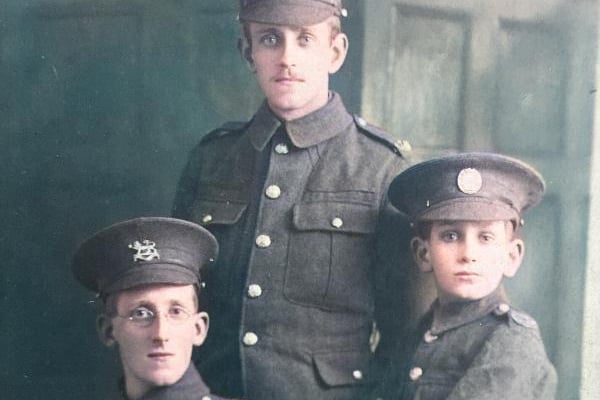
The plan was to land a force of 20,000 men on the shores of the bay. They were the second wave of the attack. The men who landed remained unopposed and inactive for a whole day. This fatal delay allowed the heavily diminished Turkish forces to rush up reinforcements and establish almost impregnable defensive positions.
When George was sent with the Herefords into action the next day to support a company of Sherwood Foresters they were met with a wall of Turkish artillery and well-concealed snipers. It took a heavy toll.
A lack of leadership and hopeless inertia shown by senior generals entailed that the Herefords would not leave the Gallipoli Peninsula until December.
By that time, disease and exposure had also conspired to decimate the ranks of the Herefords.
When they finally left the same bit of beach they had landed upon four months previously they were a shadow of their former strength.
Captain Ashton wrote in his diary, “By a strange coincidence we left from identically the same bit of beach as we had landed on just 18 weeks before. It was impossible to help but notice the contrast - that brilliant August morning the battalion full of fight and endeavour, 750 strong - this dark December night slinking away, under 100 strong, weary, dirty, and disillusioned."
George Davies was one of the few who survived, but only just. He was invalided home, unconscious with rheumatic fever.
George made a full recovery, and after the war, he moved to Abergavenny and became the Goods Agent on the Railway for the LMS at Blaenavon where he met his wife Dorothy. They married in 1922 and started a family.
George’s second son Donald kindly allowed the Chronicle to see a speech George made not long after the war detailing some of his experiences of the conflict. It makes for interesting reading.
George who enlisted a few weeks after the outbreak of war together with about a dozen friends recalls, “I often picture the early days of the war, parading the streets of our native town led by a band who could play one tune only and rather badly. It was a good time but we were soon to be disillusioned.”
George notes that business commenced in earnest when they arrived in Aberystwyth, and explained, “I was always a fairly good walker but never bargained for a march of 85 miles in five consecutive days, carrying a kit as heavy as myself and in warm weather. It may be good for stout people but I did not relish it.”
George explained that in the early days of July 1915, there was a sense something of import was going to happen as they were issued with clothing suitable for the tropics.
Upon setting sail George said, “We embarked and pursued a zig-zag course in the Mediterranean. I did not envy the Skipper his job. For he was responsible for a cargo of 4000 men.
“I sometimes think now of the high-spirited lads who set out on the perilous expedition. Hundreds never to return, only as cripples and invalids.”
George remembers how they docked for a few days in Egypt next to a Russian warship where both sets of troops sang to one another at night, “Creating an almighty din”
Recalling his experiences of Gallipoli, George explained, “It is not a cheerful story. Suffice it to say that I lost more than one personal friend. Not only had we the Turks to fight but also thirst, hunger, and disease.”
George also explained how remarkable it was that the boys on the front line’s chief concern was to stop people worrying about them back home.
“I was shown a postcard which I wrote the second day after landing at Suvla Bay. It read, ‘Keep smiling. All quite safe. Everything lovely.’
“I well remember writing that card in ghastly company, my lips cracking for a drink of water and my younger brother and some pals were missing. The din at the time was appalling and the very earth was trembling with concussion.”
George recalls how insects were yet another thing to contend with at Gallipoli.
“We were terribly plagued by flies, millions of them, and no doubt they were largely responsible for the various diseases so prevalent. It was nearly impossible to eat without also partaking of flies as well.”
Food shortages were such that when George left Gallopili he weighed only six stone and two pounds. A far cry from the healthy recommended weight for a man who was six foot tall.
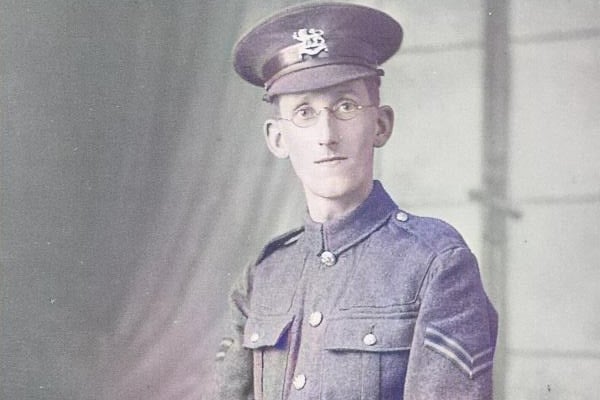
George said, “For nearly five months I only ate about two loaves of doughy bread and I sustained myself nearly a week on a crust. Needless to say, I have never valued bread more than since my return.”
Not wishing to sound afflicted with self-pity, George added, “I am not in any way mentioning mine as an isolated incident, it is but one in thousands and my experiences are perhaps not so bad as theirs. It’s just I can find nothing in that unfortunate expedition but what is too sad to relate.
“Yet I consider the greatest catastrophe of all was the terrible storm of that November which was felt by us all in its severity.
“We were all very poorly nourished and the sudden changing of the temperature from almost tropical heat to intense cold played havoc with the men.
“Our regiment had been in the firing line for over five weeks when water rushed down from the hills, transforming our trenches into rapid rivers, washing men and material out to sea. Breast high in water we spent that night, and the next day when frost set in, worn and exhausted after months of terrible hardship, brave men succumbed before our eyes.”
An eye witness to the roll call of George’s regiment the next morning recalls, “Remaining was a mere handful of men, mostly with frostbitten feet or hands, while the road from the trenches to the beach was scattered with men. The helpless living with the dead.”
George was one of the fortunate ones. He was found frostbitten and unconscious on the beach. He did not regain consciousness properly until reaching the port at Alexandria. After three months of hospital care in Egypt, he was invalided home to Britain and discharged.
After the war, George reflected, “I am happy in the knowledge I have done my duty, but I must say I look at life from a very different standpoint now.”
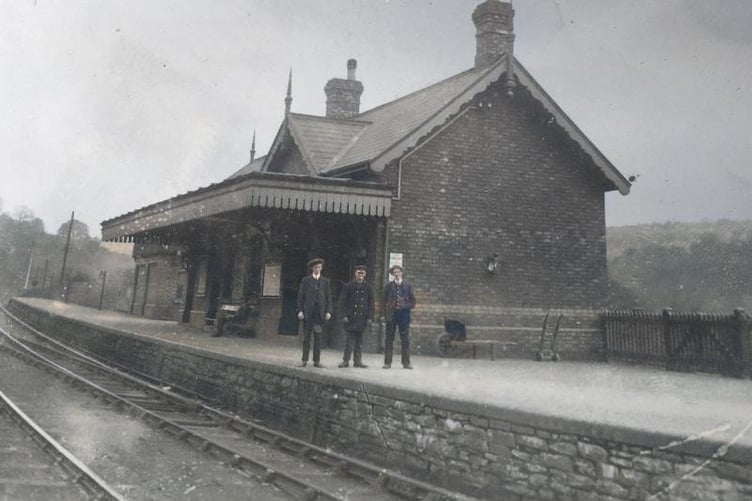
Throughout the First World War, correspondence through letters was for millions of troops a much-needed and life-affirming link to their homes and loved ones.
In a different era devoid of the internet and e-mails, with no communications satellites and limited telephone access, the art of putting pen to paper was a vital ingredient of wartime life at home and abroad.
Those on the front line longed for news from home, while those at home anxiously awaited the comfort of a familiar handwritten scrawl that guaranteed their sweethearts, sons, and fathers remained safe and sound.
Thankfully, many letters written during that period have survived the ravages of time, and serve as important historical documents and poignant testaments to the men who fought.
Their humour, humility, and continued hope were vividly captured for posterity in thoughts that became words, and words that became sentences, and sentences which became stories, and stories that made a home in the heart of their intended listener.
Letters written in the cauldron of uncertainty and insecurity that define such times, transcend their basic components of ink, paper, grammar, and dictionary definitions.
They conspire to conjure forth the unwavering light of humanity that refused to be snuffed out by the monstrous shadow of war.
War in the trenches did not just involve fighting the Germans, it was a constant war against both nervous and physical exhaustion, disease, the elements, boredom, and vermin.
Dysentery, nephritis, tuberculosis, and frostbite were all commonplace, as was a lack of food and sleep deprivation.
Although life in the trenches, surrounded by filth and rotting corpses was appalling, its horror paled into comparison when faced with going over the top and into the carnage that awaited in the ravaged and bleak landscape of no-man’s land.
So dreaded was the moment of making the final ‘big push’ into the great unknown, that when hearing the news that his brother was considering enlisting, Second Lieutenant Ernest Routley wrote telling him, “You probably think it’s a very fine thing to come out here and be killed.
“Well just wait. It isn’t being killed that worries you; it’s the waiting for it. Just wait until you hear you have got to attack, and then as you are waiting your turn to go over the top, you see your pal get cut down by machine gun fire, and then see if you think it’s a glorious thing to die. It would be glorious if you could have a fair fight, but it’s absolute murder here and you don’t get a sporting chance. If only I could get home out of it.”
Others who went over the top and survived lost their faith in both God and the cause as Lieutenant Peter Layard, Suffolk Regiment, wrote in 1916.
“I rather hate watching these strafes in a way, because you think of all the poor men being broken and killed - and for what? I don’t believe even God knows.
“Any faith in religion I ever had is most frightfully shaken by things I’ve seen, and it’s incredible that if God could make a 17-inch shell not explode - it seems incredible that he lets them explode.....We kill them (the Germans) because they’d kill us if we didn’t and vice versa, and if only we could come to an ordinary agreement - But we can’t.”
The fragments of humanity that linger long after the falling of the last shell, the firing of the last bullet, and the thrust of the last bayonet are best encapsulated by Lieutenant Angel of the Royal Fusiliers who when writing about his time waiting to lead the troops over the top revealed.
“Everyone was on edge and as I crawled up to one shell-hole I could hear a boy sobbing and crying. He was crying for his mother. It was pathetic really, he just kept saying over and over and again, ‘Oh Mum! Oh Mum! Nothing would make him shut up, and while it wasn’t likely that the Germans could hear, it was quite obvious that when there were lulls in the shell fire the men in shell holes on either side would hear this lad and possibly be affected.
“Depression, even panic can spread quite easily in a situation like that. So I crawled into the shell hole and asked Corporal Merton what was going on. He said, ‘It’s his first time in the line, sir. I can’t keep him quiet, and he’s making the other boys jittery.’
“I tried to reason with the boy, but the more I talked to him the more distraught he became, until he was almost screaming. ‘I can’t stay here! Let me go! I want my Mum!’ So I switched my tactics, called him a coward, threatened him with court-martial, and slapped his face as hard as I could, several times. It had an extraordinary effect. There was absolute silence in the shell-hole and then the corporal, who was a much older man, said, ‘I think I can manage him now, sir.’ Well, he took that boy in his arms, just as if he was a small child, and when I crawled back a little later to see if all was well, they were both lying there asleep and the corporal still had his arms around the boy. At zero hour they went over together.”
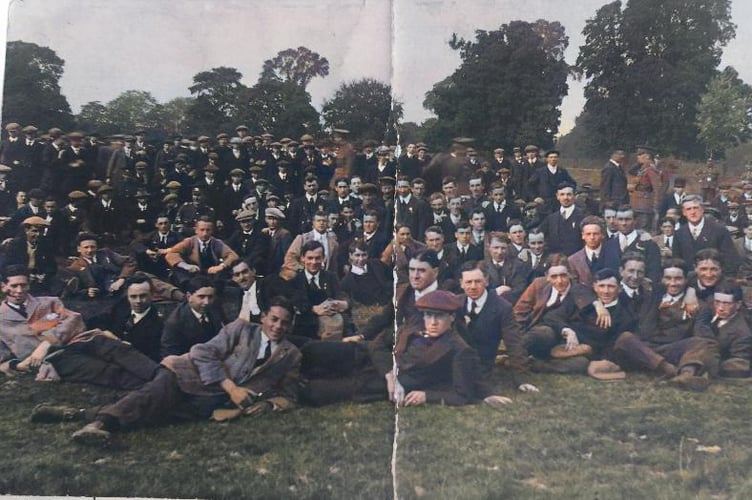

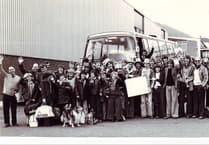
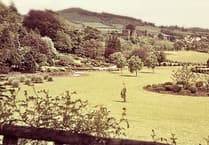
.jpg?width=209&height=140&crop=209:145,smart&quality=75)
Comments
This article has no comments yet. Be the first to leave a comment.